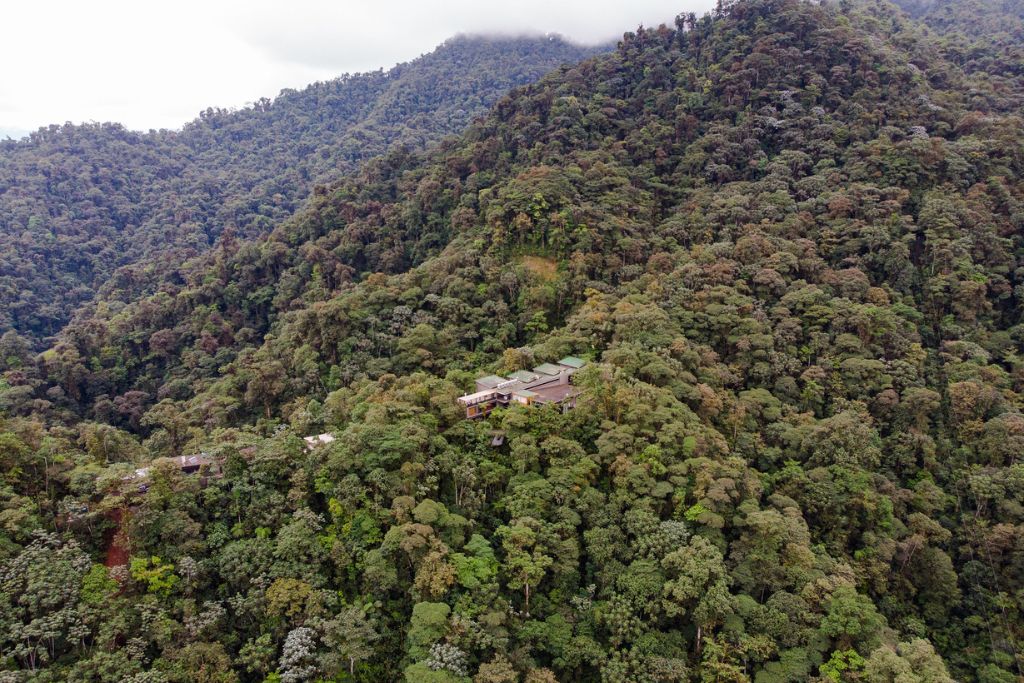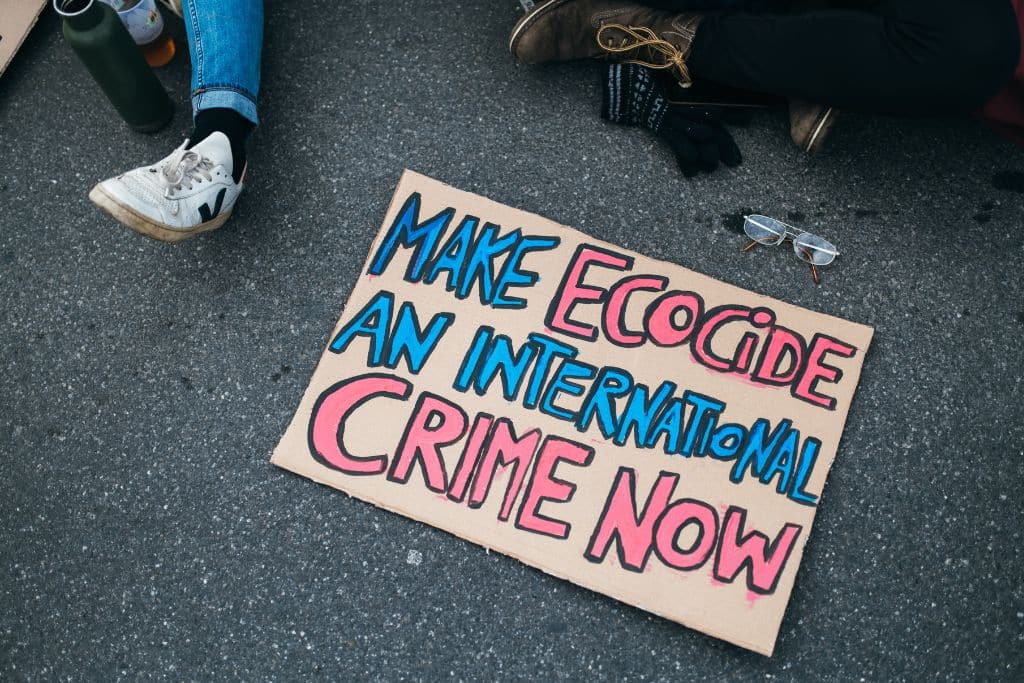Between 1962 and 1971, the US military sprayed millions of gallons of Agent Orange, a herbicide containing the toxic contaminant dioxin, to defoliate the forests of South Vietnam and expose Vietcong forces. Many described the military operation as ecocide. But 50 years on, ecocide remains controversial in international law, and only limited jurisdictions have criminalized it.
—
Ecocide refers to the act of deliberately harming the environment. The term was debated in specific international law circles between the 1970s and 1990s, and re-entered international discourse when Scottish barrister and environmental lobbyist Polly Higgins submitted a proposal in 2019 to amend the Rome Statute to include ecocide as a crime.
The Rome Statute is the international treaty and foundation of the International Criminal Court (ICC). It creates a legal framework for prosecuting individuals for international crimes. Following Higgin’s submission to the ICC, the Maldives and Vanuatu requested all parties to the Rome Statute to make an amendment to criminalize ecocide.
Ecocide in International Law
Today, international law does not specifically ban ecocide.
The closest restriction to an “ecocide provision” that currently exists in international law is Article 8(2)(b)(iv) of the Rome Statute. The article states that “Intentionally launching an attack in the knowledge that such attack will cause…widespread, long-term and severe damage to the natural environment”. This is qualified by a statement that it should be known that the damage caused to the environment “would be clearly excessive in relation to the concrete and direct overall military advantage anticipated”.
The provision sets an incredibly high threshold that is extremely difficult to establish. As such, no cases have been prosecuted in the ICC based on the article since its insertion in 1998.
Which Countries Criminalize Ecocide?
Despite being described as “radical” by some commentators, ecocide laws have been implemented into the domestic laws of several countries in the past three decades.
In 1990, Vietnam became the first nation to adopt ecocide into its criminal law framework. Article 342 of Vietnam’s Penal Code provided that “those who, in peace or war time, commit…acts of ecocide or destroying the natural environment, shall be sentenced to between ten years and twenty years of imprisonment, life imprisonment or capital punishment.” However, the country has since removed the ecocide provision in its latest version of the Penal Code, nonetheless retaining prohibitions against illegal forest destruction (article 189).
After the collapse of the Soviet Union, several former Soviet republics incorporated ecocide into their criminal codes. In the Criminal Code of the Kyrgyz Republic, following article 373 concerning genocide, article 374 prohibits “massive destruction of the animal or plant kingdoms, contamination of the atmosphere or water resources, and also commission of other actions capable of causing an ecological catastrophe.” Many of the former Soviet republics mirror each other with similar provisions.
The most recent example of implementing a domestic ecocide law is Belgium, which in 2024 became the first European nation to adopt ecocide into their Penal Code.
The table below summarizes all the jurisdictions that previously or currently have ecocide laws in effect. It should be noted that all of them have some form of mens rea (intention or knowledge) requirement. In other words, it must be established that the perpetrator intended to or knowingly or recklessly committed the crime. Such a crime contrasts with a strict liability crime, which has no such requirement. For the former Soviet republics, it is a general principle that even if intent is not specifically mentioned in the article itself, the crime is presumed to require mens rea unless explicitly stated otherwise.
| Country | Status | Law | Provision | Content | Mens rea requirement |
| Vietnam | No longer in effect | Penal Code | Article 342 | “Those who, in peace or war time, commit…acts of ecocide or destroying the natural environment” | N/A |
| Uzbekistan | In effect | Criminal Code of Uzbekistan | Article 196, 198 | Article 196: “Pollution or damage of land, water, or atmospheric air, resulted in mass disease incidence of people, death of animals, birds, or fish, or other grave consequences.” Article 198: “Damage or destruction of crops, forest, or other plants as the result of negligent dealing with fire, resulted in large damage or other grave consequences.” | Presumed yes (from general criminal law) |
| Tajikistan | In effect | Criminal Code of the Russian Federation | Article 400 | “Mass destruction of flora and fauna, poisoning the atmosphere or water resources, as well as commitment of other actions which may cause ecological disasters” | Presumed yes (from general criminal law) |
| Russia | In effect | Criminal Code of the Russian Federation | Article 358 | “Massive destruction of the animal or plant kingdoms, contamination of the atmosphere or water resources, and also commission of other actions capable of causing an ecological catastrophe” | Presumed yes (from general criminal law) |
| Republic of Moldova | In effect | Criminal Code of the Republic of Moldova | Article 136 | “Deliberate mass destruction of flora and fauna, poisoning the atmosphere or water resources, and…other acts that may cause or caused an ecological disaster…” | Presumed yes (from general criminal law) |
| Kyrgyzstan | In effect | Criminal Code of the Krygyz Republic | Article 409 | “Mass destruction of flora or fauna, poisoning of the atmosphere or water resources…[and committing] other actions that [lead] to an environmental disaster” | Presumed yes (from general criminal law) |
| Kazakhstan | In effect | Criminal Code of the Republic of Kazakhstan | Article 161 | “Mass destruction of flora or fauna, poisoning the atmosphere, land or water resources, [and committing] other acts which caused or a capable of causation of an ecological catastrophe” | Presumed yes (from general criminal law) |
| Belarus | In effect | Criminal Code of the Republic of Belarus | Article 131 | “Intentional mass destruction of plant or animal life, or the poisoning of atmospheric air or water resources, or the commission of other intentional acts capable of causing an ecological catastrophe (ecocide)” | “Intentional” per the provision itself |
| Ukraine | In effect | Criminal Code of Ukraine | Article 441 | “Mass destruction of plant or animal life, poisoning of the atmosphere or water resources, as well as the commission of other acts that may cause an ecological catastrophe” | Presumed yes (from general criminal law) |
| Armenia | In effect | Criminal Code of the Republic of Armenia | Article 154 | “mass destruction of flora or fauna, contamination of the atmosphere, soil, lithosphere or water resources, polluting or otherwise causing an ecological catastrophe” | Presumed yes (from general criminal law) |
| France | In effect | French Environmental Code | Article L231-1 | “Manifestly deliberate violation of a particular obligation..[by] emitting into the air, throwing, discharging…directly or indirectly, one or more substances whose action or reactions cause serious and lasting harmful effects on health, flora, fauna” | Yes –deliberate violation |
| Belgium | In effect | Belgian Penal Code | Article 94 | “deliberately committing an unlawful act causing serious, widespread and long-term damage to the environment knowing that such acts cause such damage” | Yes – deliberate commission but also recklessness |
Challenges in Prosecuting Ecocide and Potential Solutions
Expanding ecocide out of a military context
Under the current international law framework, an ecocide-like action is only illegal if it is known that the damage caused to the environment “would be clearly excessive in relation to the concrete and direct overall military advantage anticipated” (Article 8(2)(b)(iv) of the Rome Statute).
In 2016, the Office of the ICC Prosecutor stated that they would prioritize environmental crimes that resulted in environmental destruction and natural resource exploitation, though as mentioned above, no such cases have been prosecuted in the ICC to date.
In 2024, the Office of the ICC Prosecutor released a policy document outlining strategies to prosecute environmental crime through other provisions such as Article 7(1)(d), which criminalizes deportation or forcible transfer of population. This means that destroying homes or polluting the environment, which forces communities out of their homes, could be an environmental crime and potentially an act of ecocide that breaches this provision.
The ICC Prosecutor’s desperate efforts to overcome the limited protection for the environment in Article 8(2)(b)(iv) demonstrates that there is an urgent need for reform. A new environmental crime and ecocide provision should extend beyond wartime contexts, with no exemptions allowed for military or economic gain.

Should Intent Be Removed From Ecocide?
Many commentators, including Higgins herself, have argued that ecocide should not be a law of intent but rather a strict liability crime. Proving intent has been viewed by many as a barrier to the successful prosecution of ecocide.
During early debates over inserting a crime of environmental destruction into the Rome Statute’s draft, Austria and other countries opposed an intent requirement, as perpetrators usually act with a profit motive. On that basis, Austria argued it is difficult to establish intent if the primary subjective intent is not environmental destruction.
However, an intent requirement does not have to be conceptualized in such a way. A mens rea requirement can be determined objectively, based on the external behavior of the perpetrator and can even be a standard of “recklessness” – such as in the Belgian Penal Code. A correctly formulated intention requirement will not render the crime of ecocide unenforceable, even against corporate actors. There are extensive studies demonstrating that corporations are regularly prosecuted for intent-based crimes such as fraud or cartel conduct – consequently facing enforcement actions and criminal sanctions or being forced to settle. Moreover, in order for a potential ecocide law to remain faithful to its original concept, a mens rea requirement is arguably necessary. In response to the Vietnam War, Galston forcefully protested the United States by condemning ecocide – the “wilful and permanent destruction” of the environment. Galstons’ use of the term ecocide was powerful because of its connection to genocide. If ecocide was merely a strict liability crime, the crime may be more easily enforced but at the cost of losing its gravity and meaning.
Ecocide should not be considered an all-encompassing term for environmental crime. Instead, it has long been, and should continue to be considered, a sub-category of environmental crime.
Countries that currently incorporate ecocide law generally mandate some form of mens rea requirement. Moreover, ecocide is distinguished in all countries from other environmental crimes of strict liability, such as breaching air or water pollution standards in Poland and Russia. Ecocide is also heavily punished in domestic law frameworks, with penalties attaching to the crime often ranging between eight and 20 years imprisonment.
If ecocide is to be the most heinous example of environmental crime, then its legal threshold should be set accordingly. An intent threshold is necessary if ecocide is to be conceptualized in such a way.
More on the topic: Explainer: What Is Environmental Crime?
What if Intent Is Not Removed?
A solution to ecocide being too narrow is to broaden other environmental rights. For example, in Ecuador – albeit not being an ecocide law – there are constitutionally recognised rights for nature itself.
Article 71 of the Ecuadorian Constitution provides that “Nature, or Pacha Mama, where life is reproduced and occurs, has the right to integral respect for its existence and for the maintenance and regeneration of its life cycles, structure, functions and evolutionary processes.”
Article 71 calls on public authorities to enforce the rights of nature, such as the right for nature to be restored under Article 72. As it is not a penal provision, if the environment is harmed through irresponsible deforestation or pesticide use – even if intent and therefore ecocide cannot be proved – the constitution still demands that nature be restored to its original state.
Insofar as the law operates as a holistic and restorative mechanism, legal rights for nature itself may be more effective than punitive action against bad actors.

Ecocentrism
International environmental law, through the Rome Statute, prohibits a certain form of ecocide in the context of war and crimes against humanity. Beyond this, a number of countries have taken the initiative to criminalize ecocide in their domestic law frameworks.
Ecocide is a mechanism that should be used to protect ecosystems and communities that depend on them from deliberate acts of wilful destruction. However, such legal frameworks remain largely anthropocentric – they prioritize human interests over the environment. To create a more balanced and effective system, this approach should be complemented by ecocentric principles. Granting legal rights to nature itself –as championed by Ecuador in its constitution – offers a more holistic path to environmental protection. Such a paradigm shift can help ensure the preservation of natural systems not just for human benefit, but for their own intrinsic value.
Featured image: Ivan Radic/Flickr.
This story is funded by readers like you
Our non-profit newsroom provides climate coverage free of charge and advertising. Your one-off or monthly donations play a crucial role in supporting our operations, expanding our reach, and maintaining our editorial independence.
About EO | Mission Statement | Impact & Reach | Write for us








